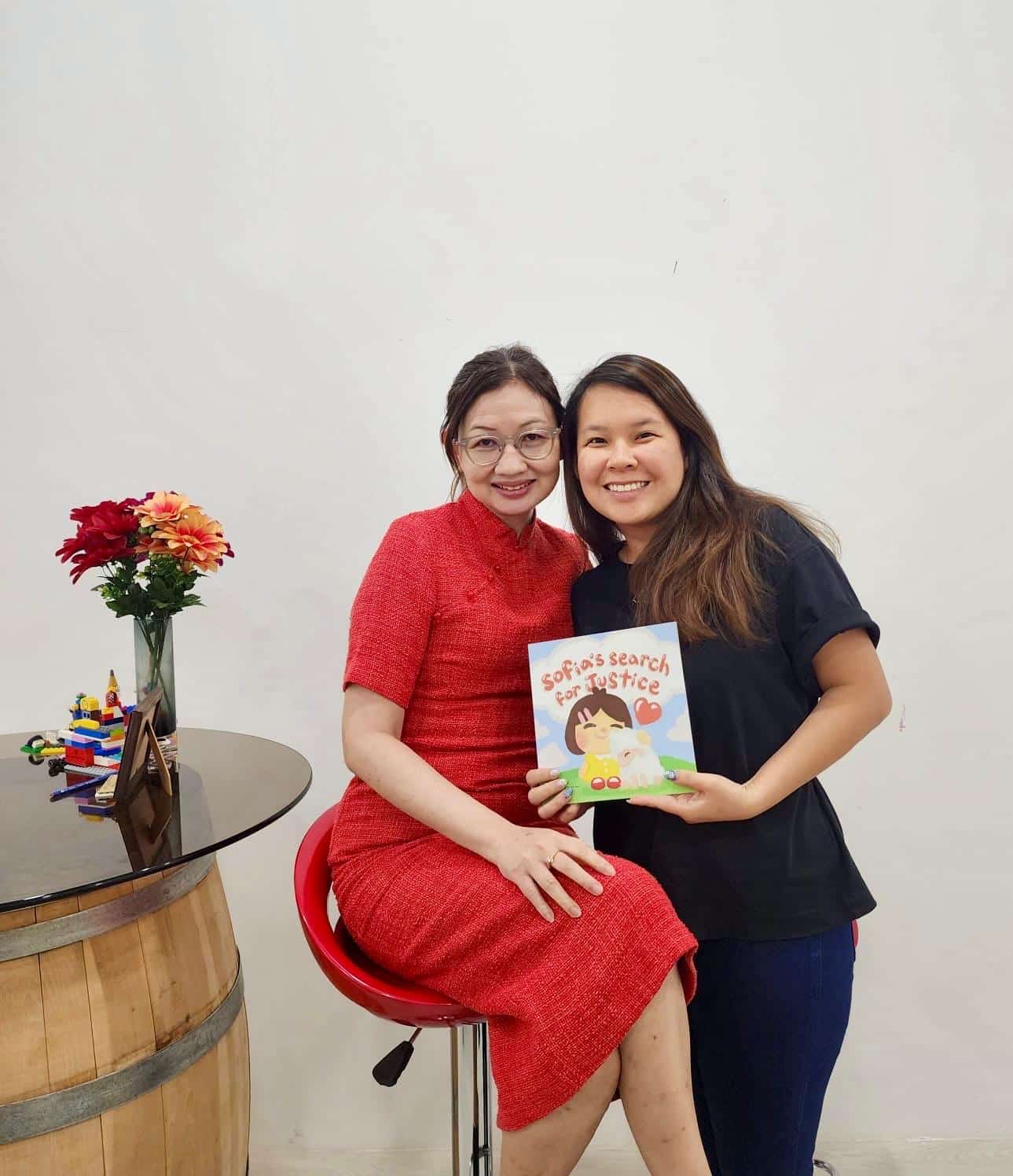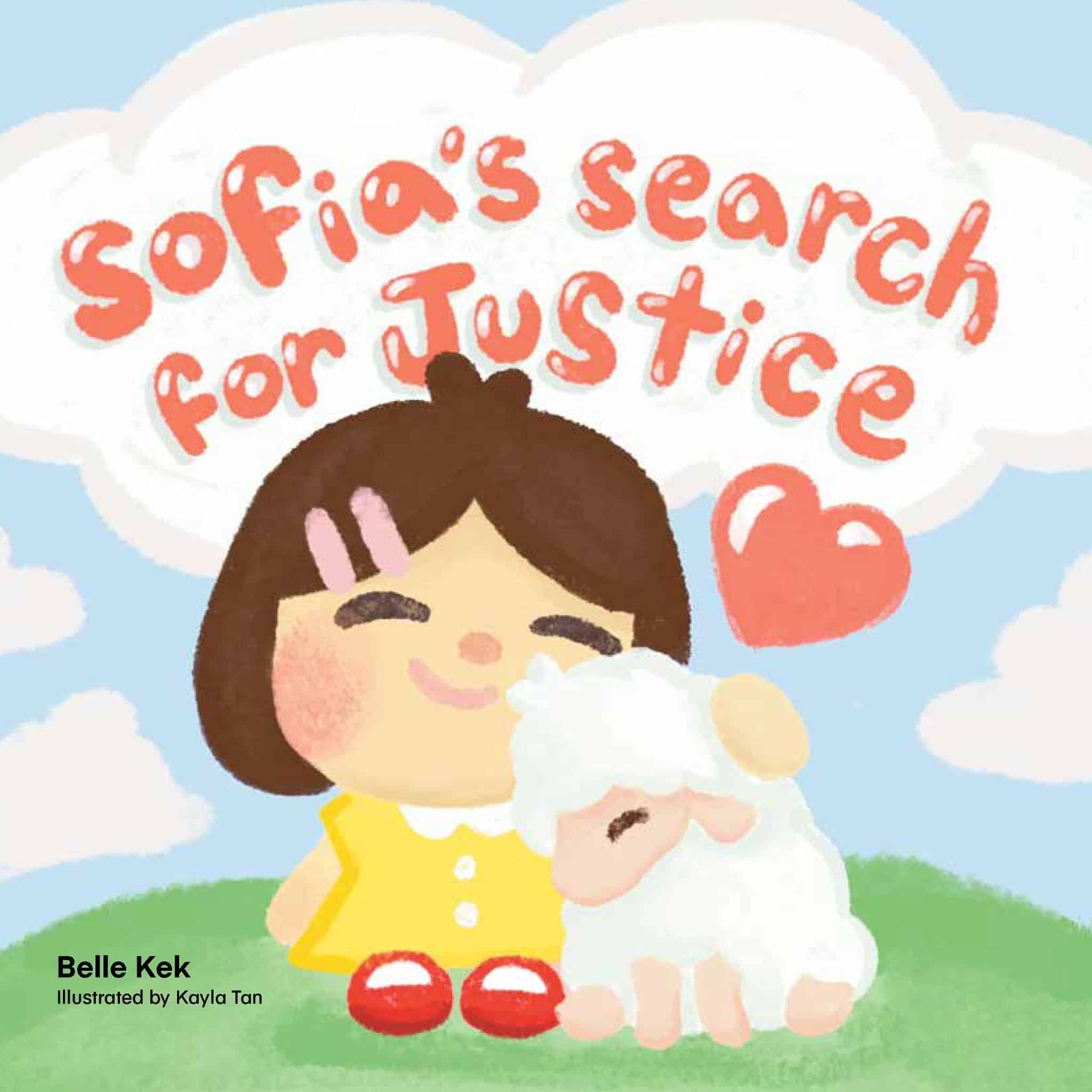What justice would you seek if a car hit your pet? This children’s book teaches the concept of restorative justice
Jingting Chen // April 2, 2025, 11:51 pm

Author Belle Kek believes that in a conflict, both parties, who are created in the image of God, should be given the opportunity to share their emotions and intentions. All photos courtesy of Belle Kek.
Belle Kek was walking home late one night when she felt someone yank her tote bag off her shoulder. The man pulled on the bag so hard, its strap broke.
“I froze. Then I screamed, but nobody came to help me. I felt powerless,” Belle told Salt&Light, recalling the snatch theft that happened to her more than 10 years ago.
The man took off with her wallet and a new Samsung mobile phone, which was the latest model at that time and “very expensive,” she said.
Eventually, he was caught and sentenced to prison.
Not punishment but restorative justice
Most people would think that with the offender behind bars, justice has been served.
Yet Belle, 49, believes that there is more to justice than the punishment of the person who caused harm.

Belle (in red) with her friend Amanda who bought her book.
Belle, who has more than 10 years of social work experience in Singapore with South Central Community Family Service Centre and Lutheran Community Care Services, is an advocate and practitioner of restorative justice.
Restorative justice aims to create a safe space for parties affected by a crime or harm to come together to discuss how amends can be made or how similar incidents can be avoided. These parties may include the victim, the offender and members of their community who can help to deal with issues that lead to the committing of the crime or harm.
Restorative justice’s emphasis on mending relationships and involving the community is a stark contrast to the conventional understanding of “justice”, which usually centres on the penalty dealt to the offender.
Restorative justice’s emphasis on mending relationships is a stark contrast to conventional justice that centres on penalty.
To Belle, restorative justice considers the humanity of both the one who was harmed and the one who caused the harm. She believes that both parties, who are created in the image of God, should be given the opportunity to share their emotions and intentions.
“Everyone has a background. Everyone has a context. Everyone has their own struggles,” said Belle, who worships at Lutheran Church of Our Redeemer.
“I keep thinking about the person who harmed me. What was he like? Why would he do that? Does he know that he has hurt people? How is he now?”
Creating awareness through a children’s book
When she was working as a social worker, Belle found that many of her adult clients struggled to understand and accept the principles of restorative justice. Some thought that bringing victim and offender together to share about their experiences would “re-victimise” the one who was harmed, she told Salt&Light.
Seeing the skepticism of adults about restorative justice, Belle decided to write a children’s book about the subject.
The married mother of one wants to change people’s perception of justice, though she recognises that such a transformation takes time. “Change may not happen in this generation, but maybe it can happen in another generation?”
Taking a leaf out of Aesop’s Fables, an ancient collection of short stories that teach moral lessons, Belle set out to create a book that would educate the young on the principles of restorative justice.
Last December, Belle’s book Sofia’s Search for Justice was published by Candid Creation Publishing.

When Sofia’s pet lamb is run over by a car, she embarks on a journey to find justice. This children’s book teaches the concept of restorative justice to all ages.
The protagonist Sofia, named after Belle’s six-year-old daughter, is a little girl who turns to God for guidance on how she should respond to her pet lamb being hit by a car.
In the book, Sofia struggles with anger, confusion and guilt over the harm inflicted on her beloved pet.
The turning point comes when Sofia asks the question, “What is making things right in God’s eyes?” She finds the answer in Matthew 6:12: “And forgive us our debts, as we also have forgiven our debtors.” (NIV)
Forgiveness and making peace
Through Sofia’s story, Belle offers readers a biblical understanding of forgiveness. Many people are encouraged to forgive so that they will “not be burdened” by unforgiveness, but to her, “the motivation to forgive is more than doing it for the sake of one’s self.”
“The biblical perspective is that you forgive because God forgave you,” she said. “Because of the forgiveness God has shown you, you want to do the same to others.”
Belle understands that humanly, it can be a struggle to forgive. “We need to focus on God, to seek to understand His goodness and intent for humanity to embrace forgiveness.”
“The biblical perspective is that you forgive because God forgave you”
In her book, Belle also highlights the importance of making peace with others.
Eventually, Sofia meets Ben, the one who hit the pet lamb with his car. Through their conversation, Sofia finds out more about Ben’s background and the circumstance that led to the accident. Ben expresses remorse and takes responsibility for hurting Sofia’s pet, while Sofia exercises empathy and forgiveness towards him.
Belle hopes to see such reconciliation happening not just in her book but also in real life, especially among Christians who are called to be peacemakers (Matthew 5:9).
“We need to focus on God, to seek to understand His goodness and intent for humanity to embrace forgiveness.”
“I feel that whenever there’s a conflict, we kind of ‘outsource’ peacemaking to specialists like counsellors and legal experts,” said Belle. “We never get around to talking to the people involved to resolve the conflict. We need to learn to talk about things and make peace with one another and with God.”
Belle’s book has garnered positive reviews both locally and overseas.
“Sofia’s Search for Justice goes against the overwhelmingly prevailing narratives about searching justice for oneself and fighting for one’s rights,” said preacher Ray Soh of Lutheran Church of Our Redeemer.
“It offers a strong, spiritual message about the ‘why and how’ of reconciliation,” said Terry O’Connell, who is widely known as the pioneer of restorative justice in Australia.
“Belle Kek has delivered a story that resonates with readers of all ages, reminding us of the power of forgiveness and the importance of seeking understanding in even the most challenging circumstances,” said Anne Hobbs, Director of the Juvenile Justice Institute at the University of Nebraska.
How to advocate for victims
Belle’s search for justice goes beyond the pages of fiction to stories of victims in real life.
In 2022, she founded the Justice Movement (@hearjustice on Instagram) to raise awareness of the needs of victims and survivors of crimes by giving them an avenue to share their stories.
For victims to find justice, they need people to listen to them and validate what they have gone through, Belle explained.
She pointed out that society tends to blame the victim instead of seeking to understand what happened.
For victims to find justice, they need people to listen to them and validate what they have gone through.
“You see that a lot on social media. A crime happens, a lot of people comment. They feel that a lot of things could have been prevented and the crime took place because of what the victim did. It is very unfair to those people who have experienced harm.”
Also, victims often grapple with shame, she said. “They may ask, ‘Out of so many people, why must this happen to me?’”
To Christians who want to help victims of crime, Belle cautions against making quick and harsh judgments.

Belle, who has a decade of social work experience, is the founder of Justice Movement which offers a platform for victims to express themselves.
“Sometimes we use our Christian values and say, ‘You’re morally wrong by being in a certain place’, or if you went out with a certain person.” Such remarks can aggravate the shame that victims are already feeling.
Instead of finding fault with them, offer victims a listening ear and ask them for the kind of support they need, Belle pointed out. She has written about using a restorative justice approach to help male victims affected by intimate partner violence.
Finally, extend patience to victims as they heal from their ordeals, she urged. “I think people feel that all is fine once the person who caused harm is caught. They don’t understand that it can be traumatising for the victim, that the victim needs time to get over the effects of the crime.”
To purchase a copy of Sofia’s Search for Justice”, email Belle at [email protected].
The book launch for Sofia’s Search for Justice falls on Saturday, April 12, 3-5pm at Orange & Teal, 35 Rochester Drive, #02-12, Singapore 138639.
RELATED STORIES:
We are an independent, non-profit organisation that relies on the generosity of our readers, such as yourself, to continue serving the kingdom. Every dollar donated goes directly back into our editorial coverage.
Would you consider partnering with us in our kingdom work by supporting us financially, either as a one-off donation, or a recurring pledge?
Support Salt&Light



